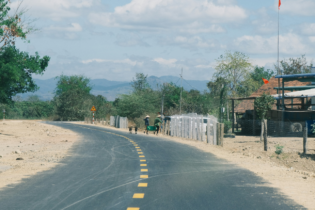The Minister of Public Works, Thulas Nxesi pointed out during his maiden budget speech earlier this week that the Department of Public Works (DPW) is coming out from a dark place characterised by corruption and mismanagement, evidenced by eight years of qualified audits, topped off by a disclaimer in the previous audit.
“We stand at a crossroads,” he explained. “We know what the problems are and we have developed a broad strategy to turn the department around. The task now is to implement.” In line with previous statements he has made since his appointment he reiterated that “nothing I promise you here today will come to fruition until, and unless, we tackle the underlying systemic flaws in the department.” The DPW has been allocated R8 billion for the fiscal year 2012/13. This represents an increase of approximately 2% from the previous year’s budget. “The message to us is clear: don’t even think of a real increase in budget until there is a real improvement in performance,” explained Nxesi. The R8 billion budget reflects government priorities and the department’s efforts to address the following: Outcome 4: Creating decent employment through inclusive economic growthOutcome 8: Sustainable human settlements and improved quality of household life, and
Outcome 12: Creating an efficient, effective and development oriented public service and an empowered, fair and inclusive citizenship. The department contributes to attaining the further two outcomes: Outcome 5: A skilled and capable workforce to support an inclusive citizenship, and
Outcome 6: To create an efficient, competitive and responsive infrastructure network. In addition to its core mandate as custodian and manager of the state’s immovable assets, the department has a mandate to create jobs and work opportunities and to address skills shortage, particularly in the built environment professions. Expanded Public Works Programme
EPWP is a flagship programme of the department and government- it forms part of the response to the triple challenge of poverty, unemployment and inequality. The department’s target in the second phase of the EPWP, for the period 2009-2014, is to create 4.5 million work opportunities. With more than 2 million work opportunities already created since 2009, the departmentis well on the way to exceeding that target. Capital projects
In the course of 2012-13 some 250 projects are scheduled for completion. The department has created 200 000 jobs – directly or indirectly – over the last five years. The department will also resuscitate the departmental workshops to develop in¬house maintenance capacity, as well as providing training opportunities for some 500 graduates and students in the built environment sector. This will include the training of professionals, technicians and artisans. Asset investment management
The department’s long term infrastructure plan comprises three key elements:
1. First, new buildings, replacements, upgrades and additions – to ensure service delivery to clients and the public from appropriate buildings;
2. Second, maintenance and repairs – to safeguard existing assets.
3. Third, rehabilitation, renovations and refurbishments. Nxesi also pointed out that his departmentis committed to the conservation of state buildings – some of which are heritage buildings and some of which have fallen into disrepair. This is central to the Inner City Regeneration strategy, as well as the department’s strategic goal of shifting the larger percentage of government accommodation away from leases to occupation of our own buildings. Eleven buildings were rehabilitated last year, with a further 10 earmarked for this year. Policy: Transforming the built environment
The DPW remains responsible for the regulation and transformation of the construction and property sectors. The following programmes are key:
– Implementation of the Construction Sector Charter codes
– The National Contractor Development Programme- driven by the Construction Industry Development Board (cidb)
– The Contractor Incubator Programme (CIP) contributing to the development of emerging contractors between grades three and seven
– The Property Incubator Programme (PIP)
– Active participation in the Property Sector Charter Council. The greening of the built environment represents a major new direction in the work of the DPW. It is developing a Green Buildings Policy in line with the principles of the Green Economy Accord. The department’s public entities
– Agrement South Africa is a world class technical assessment agency whose primary role is the assessment and certification of non-standard construction products in South Africa. – The cidb was established to mitigate risks in the public sector construction procurement environment; provide leadership to the construction industry and to stimulate sustainable growth. The board’s outputs include: developing standards for government tenders; combating fraud and corruption; and maintaining the contractor registration and grading system which is both a risk management tool for clients as well as a development tool for emerging contractors. – The Council for the Built Environment (CBE) advises the minister of Public Works on policy for the built environment, whilst enhancing public protection by ensuring that only registered and competent professionals are allowed to practice. It remains a concern that only 24% of registered professionals are black. The council, in partnership with the department of Higher Education and Training, is developing a candidacy programme to remove bottlenecks in the skills pipeline to allow aspiring young black professionals to attain professional registration.
– The Independent Development Trust (IDT) supports the DPW to fulfil its mandate- as well as providing project management services to other national and provincial departments. IDT supports the EPWP especially in relation to its management information system and the non-state sector programme. The Trust also delivered the following programmes on behalf of the Department: the Alternative Construction Methodology School Building Programme and the Energy Efficiency Programme.
The turnaround strategyNxesi concluded with a progress report on the turnaround strategy for the department: “First, I am not talking about a one-size fits all blueprint imposed by external consultants. A successful change process has to come from within the department, and must embed skills in the department. Secondly, any successful turnaround starts with strong and determined leadership. That’s my job from the side of the executive authority – but also requires strong leadership within the department and a shared vision of what we want to achieve. We speak about a turnaround strategy – in other words we are talking about a process, not an event. As DPW, we do not have the luxury of time. We are running a business. This is the paradox which faces us as a department: to stabilise the operations of the department short-term, whilst we embark on fundamental review and transformation in the longer term. The process has unfolded as follows: after widespread consultation, and with the assistance of the Treasury Technical Assistance Unit (TAU) which drew up a Rapid Diagnostic Report, I was able to announce a series of measures at the end of January.” These necessary measures include:
The establishment of an Inter-Ministerial Committee (IMC) to provide advice and political support to the department.Nxesihas invited the following ministers to assist him: Finance, Home Affairs, Rural Development and Land Reform, and Performance, Monitoring, Evaluation and Administration in the Presidency. Amongst the concrete interventions already made are crucial stabilisation projects, including the following:
Stabilisation project: The immovable assets register
It is an indictment of the department that comprehensive, reliable and compliant registers of the immovable assets of DPW and other custodians still do not exist. – Department officials are working closely with auditing firm, Ernst and Young on a desk-top exercise to reconcile deeds records and other existing databases to identify gaps. This exercise will be complete by the end of this month. – The cleansing of all gaps identified, accompanied by physical verification of select properties contained in the cleansed database, will take a further year to complete.
The cleansing of the Immovable Assets Register will allowfor the complete devolution of some 50 000 properties to provinces and fast track the vesting process across the board. The availability of consistent and reliable data also facilitates the optimal use of state assets for policy objectives. Stabilisation project: Leases
There are no quick wins with leases. Years of poor management, under¬ capacity and lack of financial controls have provided fertile terrain for fraud and corruption. Serious irregularities have come to light, thanks to the detailed work of the SIU. It is for this reason, that shortly after Nxesi’s appointment he removed certain financial delegations to regions of the department, such as withdrawing their powers to sign leases. Twenty-two such leases have already been identified in one region alone, involving payments of over R64 million. This includes leases where DPW paid for the duration of the lease without the building being occupied. The departmenthas instructed its lawyers to approach the High Court to nullify these irregular lease agreements, and institute civil action against whoever unduly benefited. Criminal cases are being opened against several officials; more are expected. As far as the much publicised South African Police Service (SAPS) lease is concerned, the department launched an application to the High Court to declare this lease agreement invalid. The matter is now before the Court for adjudication. Treasury has pointed out that private leases for government offices are running at R3 billion per annum, costs are rising unsustainably and represent a drain on public resources which could be used productively elsewhere. Treasury has announced a joint programme with the department of Public Works to audit all current leases of the department with the following objectives:
– To further identify irregular leases
– To collect monies owed to the department
– To establish a reliable lease register
– To review and strengthen the systems of the department relating to lease management, and to train and capacitate staff accordingly. Operations management
It is clear that the DPW has to reconfigure its operations to be responsive to clients’ needs. This has to be its point of departure, and it will be engaging its clients on how it can propose to manage their respective portfolios. This approach will be underpinned by the creation of single points of contact, greater specialisation and focused responsibility of portfolio managers for specific clients. Key outcomes of the proposed operating model include stable and accelerated service delivery as a result of high repeatability, specialisation and systematisation; as well as lower unit costs. Stabilisation Project: Clean audit
Too little, too late has been done to fundamentally change the audit outcome for financial year 2011-12. That is why, for the current year that has just commenced (2012-13) the DPW is employing additional capacity. Nxesi is confident that the first positive results of this will be visible by mid-year when the Interim Audit results are presented by the Auditor-General. Core people are on board and will be driving the first phase of interventions to stabilise key areas that have been identified through a preliminary diagnostic.








